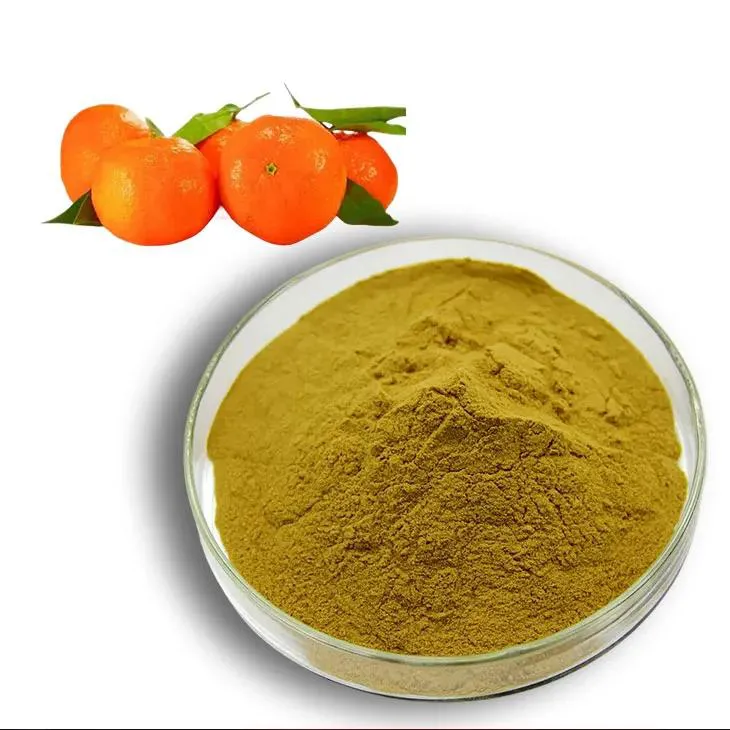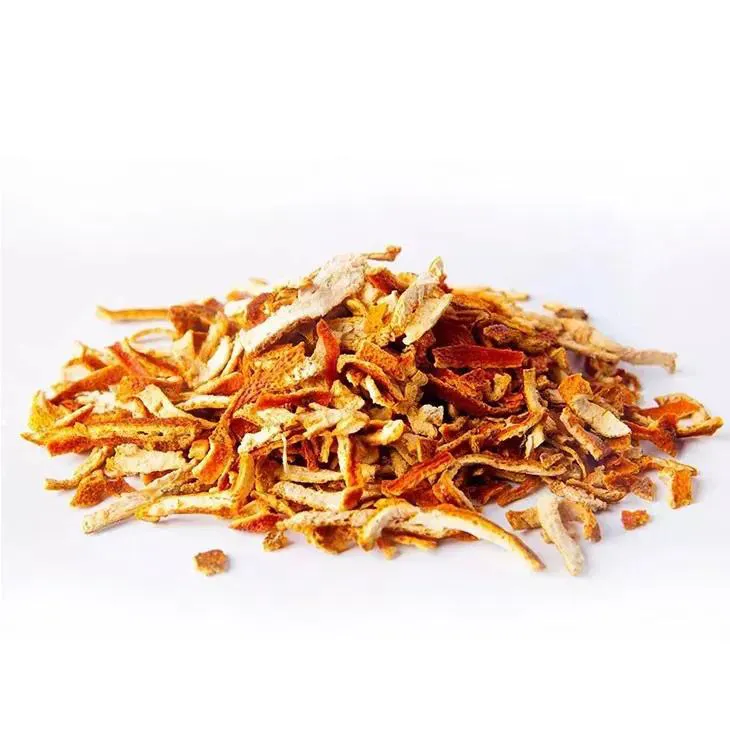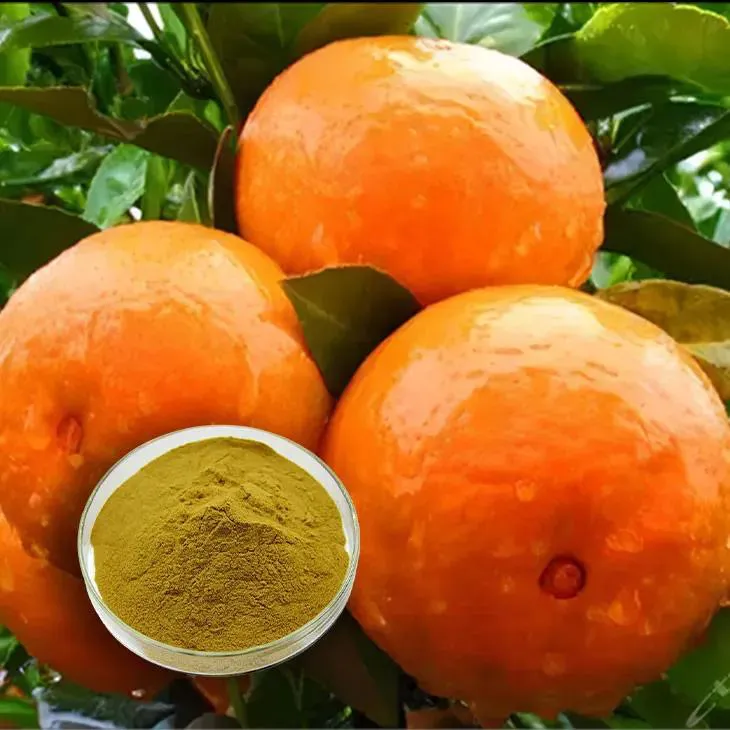- 0086-571-85302990
- sales@greenskybio.com
5 amazing things made from citrus bioflavonoids.
2024-11-11

1. Potent Anti - Inflammatory Supplements
Citrus bioflavonoids have shown great promise in the realm of anti - inflammatory supplements. These compounds possess natural anti - inflammatory properties that can be harnessed to support the body's defense against various inflammatory conditions.
The Science Behind It
Studies have indicated that Citrus bioflavonoids interact with the body's immune and inflammatory response systems. They can modulate the production of cytokines, which are small proteins that play a crucial role in inflammation. For example, some bioflavonoids can reduce the overproduction of pro - inflammatory cytokines, such as interleukin - 6 (IL - 6) and tumor necrosis factor - alpha (TNF - α). This helps to keep the inflammatory response in check and prevent chronic inflammation, which is associated with numerous health problems, including heart disease, arthritis, and certain cancers.
Benefits for Specific Conditions
In the case of arthritis, Citrus bioflavonoids may help to relieve joint pain and stiffness. They can also potentially slow down the progression of the disease by reducing the inflammation in the joints. For individuals with inflammatory bowel diseases like Crohn's disease or ulcerative colitis, these bioflavonoids could help to soothe the inflamed intestinal lining, reducing symptoms such as abdominal pain, diarrhea, and rectal bleeding.
Formulation and Consumption
Anti - inflammatory supplements containing citrus bioflavonoids are typically formulated in combination with other nutrients. For example, they may be combined with vitamin C, as vitamin C is known to enhance the absorption and effectiveness of bioflavonoids. These supplements are usually available in capsule or tablet form. It is important to follow the recommended dosage instructions provided by healthcare professionals. However, it is also possible to obtain citrus bioflavonoids from natural food sources, such as citrus fruits themselves, although the concentration may be lower compared to supplements.

2. All - Natural Beauty Products for Skin Rejuvenation
Citrus bioflavonoids are making their mark in the beauty industry as well, particularly in the creation of all - natural beauty products that rejuvenate the skin.
Antioxidant Power
One of the key reasons for their use in beauty products is their antioxidant properties. The skin is constantly exposed to environmental stressors such as ultraviolet (UV) radiation, pollution, and free radicals. Citrus bioflavonoids act as antioxidants, scavenging free radicals and protecting the skin from oxidative damage. This helps to prevent premature aging, including the formation of wrinkles, fine lines, and age spots.
Skin Brightening and Tone Improvement
Citrus bioflavonoids can also contribute to skin brightening. They can inhibit the production of melanin, the pigment responsible for skin color. By reducing melanin production, these bioflavonoids can help to even out skin tone, fade dark spots, and give the skin a more radiant appearance. Additionally, they have a tightening effect on the skin, which can improve skin elasticity and firmness.
Common Product Types
There are various types of beauty products that incorporate citrus bioflavonoids. Facial creams and moisturizers are perhaps the most common. These products are designed to hydrate the skin while also providing the antioxidant and skin - rejuvenating benefits of the bioflavonoids. Another popular product type is face masks. Citrus bioflavonoid - infused face masks can be used to give the skin an intensive treatment, deeply nourishing and revitalizing it. There are also citrus - based serums that are more concentrated and can target specific skin concerns, such as dullness or uneven texture.
Sourcing and Sustainability in Beauty
When it comes to sourcing citrus bioflavonoids for beauty products, many companies are now focusing on sustainable practices. This includes using citrus fruits that are organically grown and sourced from ethical suppliers. Some companies are also exploring ways to use the by - products of the citrus industry, such as citrus peels, which are rich in bioflavonoids, in an effort to reduce waste and promote a more circular economy in the beauty sector.

3. Delicious and Nutritious Citrus - Flavored Confections
Citrus bioflavonoids are finding their way into the world of confections, creating delicious and healthy treats with added nutritional value.
Flavor Enhancement
The natural citrus flavor of bioflavonoids makes them an ideal ingredient for confections. They can enhance the flavor of candies, chocolates, and other sweet treats, providing a refreshing and tangy taste. This natural flavor is much more appealing to consumers who are looking for alternatives to artificial flavors.
Nutritional Benefits
Unlike traditional confections that are often high in sugar and low in nutrients, citrus - flavored confections with bioflavonoids offer some health benefits. As mentioned earlier, bioflavonoids have antioxidant properties, which can help to protect the body from oxidative stress. Additionally, they can contribute to overall health by supporting the immune system. Some citrus - flavored confections may also be fortified with other vitamins and minerals, further increasing their nutritional value.
Product Examples and Innovation
There are several examples of citrus - flavored confections on the market. For instance, there are citrus - flavored hard candies that not only taste great but also contain a significant amount of bioflavonoids. In the chocolate industry, some manufacturers are creating dark chocolates with citrus bioflavonoid infusions. These chocolates combine the health benefits of dark chocolate, such as its high antioxidant content, with the added benefits of citrus bioflavonoids. There is also innovation in the form of citrus - flavored gummies, which are not only delicious but also a convenient way to consume bioflavonoids, especially for children or those who have difficulty swallowing pills.
Meeting Consumer Demands
As consumers become more health - conscious, there is a growing demand for confections that are both delicious and nutritious. Citrus - flavored confections with bioflavonoids are able to meet this demand. They offer a guilt - free indulgence, allowing consumers to enjoy a sweet treat while also getting some health benefits. This trend is likely to continue, with more companies expected to develop new and innovative citrus - flavored confections in the future.

4. Biodegradable Packaging Materials with Antioxidant Properties
The use of citrus bioflavonoids in creating biodegradable packaging materials is an exciting development with significant environmental implications.
The Need for Biodegradable Packaging
In today's world, the problem of plastic waste is becoming increasingly severe. Traditional plastics take hundreds of years to decompose, leading to pollution of land, water, and air. Biodegradable packaging materials offer a solution to this problem. They can break down more quickly and naturally, reducing the environmental impact.
How Citrus Bioflavonoids are Incorporated
Citrus bioflavonoids are incorporated into biodegradable packaging materials in various ways. They can be added during the manufacturing process of bioplastics, which are plastics made from renewable sources such as plant - based materials. The bioflavonoids can act as additives, enhancing the properties of the bioplastic. For example, they can improve the antioxidant capacity of the packaging material, which is important for protecting the contents of the package from oxidative damage. This is particularly useful for food products that are sensitive to oxidation, such as nuts, oils, and dried fruits.
Benefits of Citrus Bioflavonoid - Enhanced Packaging
One of the main benefits of using citrus bioflavonoid - enhanced biodegradable packaging is its environmental friendliness. It can decompose more quickly than traditional plastics, reducing landfill waste. Additionally, the antioxidant properties of the bioflavonoids can help to extend the shelf life of the products packaged within. This can lead to less food waste, which is another significant environmental and economic advantage. Moreover, the use of citrus bioflavonoids in packaging can also add a natural and pleasant citrus scent to the package, which can be an added marketing advantage.
Future Prospects and Challenges
While the use of citrus bioflavonoids in biodegradable packaging has great potential, there are also some challenges to overcome. One challenge is the cost of production. Currently, bioplastics with added bioflavonoids can be more expensive to produce than traditional plastics. However, as research and development continue and production scales up, the cost is expected to come down. Another challenge is ensuring the stability and effectiveness of the bioflavonoids in the packaging material over time. Scientists are working on ways to improve the formulation to ensure that the bioflavonoids retain their properties throughout the lifespan of the package.
5. Herbal Teas with Health - Promoting Effects
Citrus bioflavonoids are also being used in the formulation of herbal teas, which offer a range of health - promoting effects.
Traditional and Modern Medicinal Uses
Herbal teas have a long history of use in traditional medicine. Citrus bioflavonoids - infused herbal teas combine the ancient wisdom of herbal medicine with modern scientific knowledge. In traditional medicine, citrus fruits and their derivatives were often used to treat various ailments, such as digestive problems, colds, and flu. Modern research has shown that the bioflavonoids in these teas can have anti - inflammatory, antioxidant, and immune - boosting effects.
Flavor and Aroma Profiles
The addition of citrus bioflavonoids to herbal teas imparts a unique flavor and aroma. The citrusy notes can complement the flavors of other herbs used in the tea, creating a more complex and enjoyable taste experience. The aroma of citrus can also have a relaxing and refreshing effect, making the tea not only beneficial for health but also a pleasure to drink.
Preparation and Consumption
Preparing citrus bioflavonoid - infused herbal teas is relatively simple. The tea can be made by steeping dried herbs and citrus peel or extract in hot water for a few minutes. It can be consumed hot or cold, depending on personal preference. Some people like to add a little honey or lemon juice to enhance the flavor further. Consuming these teas regularly can be a great way to incorporate the health benefits of citrus bioflavonoids into one's daily routine.
Combination with Other Herbs for Synergistic Effects
To maximize the health benefits, citrus bioflavonoid - infused herbal teas are often combined with other herbs. For example, they can be combined with chamomile for its calming effects, or with ginger for its anti - inflammatory and digestive - enhancing properties. These combinations can create synergistic effects, where the combined action of the different herbs and bioflavonoids is greater than the sum of their individual effects.
FAQ:
Q1: What are the health benefits of citrus bioflavonoids?
Citrus bioflavonoids have several health benefits. They are known for their anti - inflammatory properties, which can help reduce inflammation in the body. They may also contribute to overall skin health, potentially reducing signs of aging when used in beauty products. Additionally, they can be part of healthy confections, providing nutritional value, and can be used in herbal teas with various health - promoting effects.
Q2: How are citrus bioflavonoids used in anti - inflammatory supplements?
Citrus bioflavonoids are incorporated into anti - inflammatory supplements due to their natural anti - inflammatory properties. Their chemical composition helps to modulate the body's inflammatory response. They can work in concert with other ingredients in the supplement to target inflammation at a cellular level, reducing pain and swelling associated with various inflammatory conditions.
Q3: Can you explain how citrus bioflavonoids are used in beauty products?
Citrus bioflavonoids are used in beauty products because they have properties that can rejuvenate the skin. They may help in promoting collagen production, which is essential for maintaining skin elasticity. Their antioxidant properties also protect the skin from damage caused by free radicals, reducing the appearance of wrinkles and giving the skin a more youthful and healthy glow.
Q4: What makes citrus - flavored confections with citrus bioflavonoids healthy?
Citrus - flavored confections containing citrus bioflavonoids are healthy because the bioflavonoids add nutritional value. They are not just flavor enhancers but also bring the benefits of anti - inflammation and antioxidant protection. This means that while enjoying the delicious taste, consumers can also get some health benefits that are not typically associated with regular confections.
Q5: How are biodegradable packaging materials with citrus bioflavonoids created?
The creation of biodegradable packaging materials with citrus bioflavonoids likely involves extracting the bioflavonoids and incorporating them into a suitable base material. The antioxidant properties of the bioflavonoids can help preserve the integrity of the packaging material. The exact process may vary depending on the type of bioflavonoids and the intended properties of the packaging, but it generally aims to create an environmentally friendly material with added functionality.
Q6: What kind of health - promoting effects can be expected from herbal teas with citrus bioflavonoids?
Herbal teas with citrus bioflavonoids can have a range of health - promoting effects. These may include anti - inflammatory effects, which can help with various health issues related to inflammation such as joint pain. They can also act as antioxidants, protecting the body's cells from damage. Additionally, they may have a positive impact on digestion and overall immune function.
Related literature
- The Role of Citrus Bioflavonoids in Health and Wellness"
- "Citrus Bioflavonoids: Applications in Nutrition and Cosmetics"
- "Bioflavonoids from Citrus Fruits: Properties and Industrial Utilization"
- ▶ Hesperidin
- ▶ Citrus Bioflavonoids
- ▶ Plant Extract
- ▶ lycopene
- ▶ Diosmin
- ▶ Grape seed extract
- ▶ Sea buckthorn Juice Powder
- ▶ Fruit Juice Powder
- ▶ Hops Extract
- ▶ Artichoke Extract
- ▶ Mushroom extract
- ▶ Astaxanthin
- ▶ Green Tea Extract
- ▶ Curcumin
- ▶ Horse Chestnut Extract
- ▶ Other Product
- ▶ Boswellia Serrata Extract
- ▶ Resveratrol
- ▶ Marigold Extract
- ▶ Grape Leaf Extract
- ▶ New Product
- ▶ Aminolevulinic acid
- ▶ Cranberry Extract
- ▶ Red Yeast Rice
- ▶ Red Wine Extract
-
Uridine-5'-monophosphate Disodium salt
2024-11-11
-
Shikone Extract
2024-11-11
-
Oyster Mushroom Extract Powder
2024-11-11
-
Soy Extract
2024-11-11
-
Berberis aristata Extract
2024-11-11
-
Marigold Extract
2024-11-11
-
Feverfew Extract
2024-11-11
-
Pomegranate Extract
2024-11-11
-
Fenugreek Extract Powder
2024-11-11
-
Natural grape seed extract
2024-11-11





















